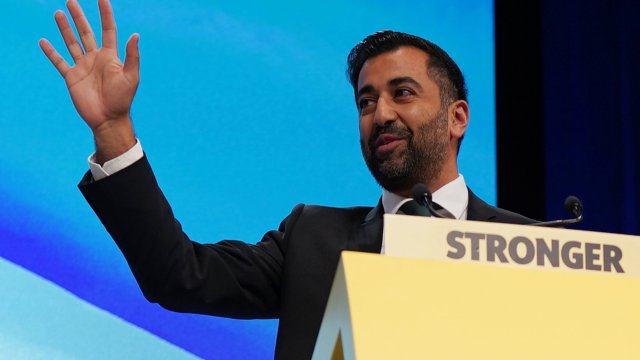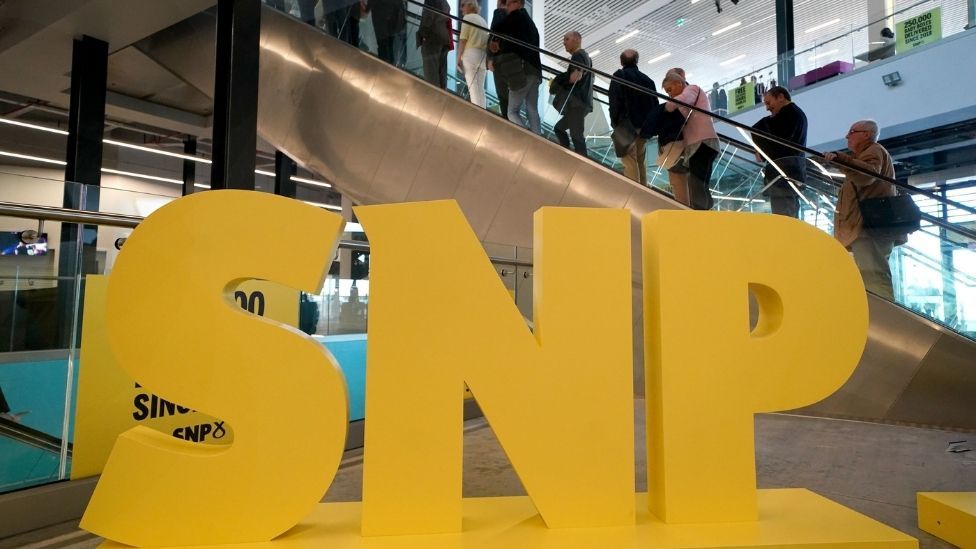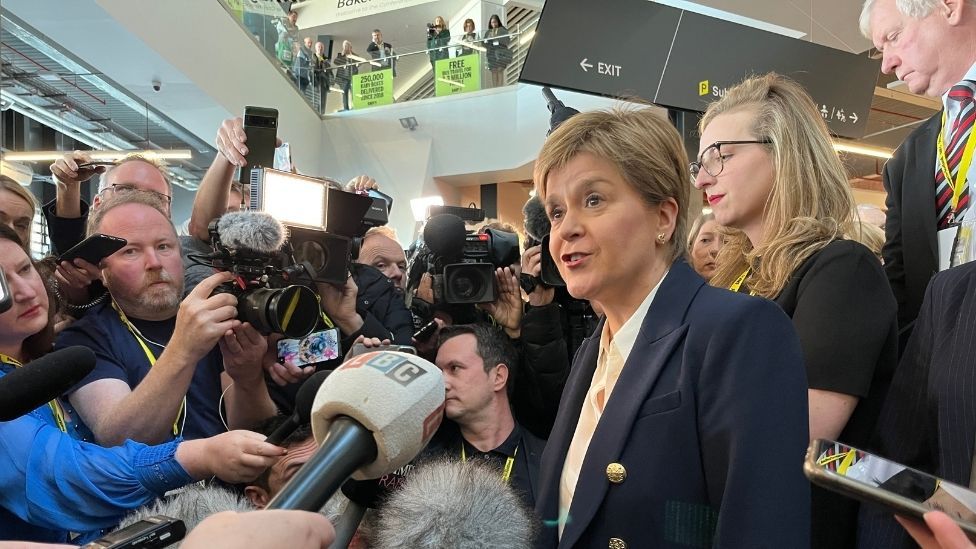
Council tax rates are to be frozen across Scotland, First Minister Humza Yousaf has announced.
The SNP leader made the announcement during his closing speech at his party’s conference in Aberdeen.
The Scottish government had previously proposed raising council tax rates by as much as 22.5% for homes in higher bands.
But Mr Yousaf has pledged they will remain at the current levels when councils set their budgets for 2024-25.
He described the proposed freeze as evidence of “the SNP delivering for people when they need it most”.
Mr Yousaf did not set out how the government would make up the budgetary shortfall for councils who would have raised taxes.
The levy generates about 13% of local government funding, with most of their cash coming from Holyrood funding.
Council tax had either been either frozen or capped at 3% since the SNP came to power in 2007, with the Scottish government providing local authorities with extra funding in return.
But councils have been allowed to use new powers to set their own rates for the past two years, with most areas seeing rises of between 4% and 7% this year – although residents of Orkney say their bills increase by 10%.
The SNP had a long-standing commitment to scrap and replace council tax and Mr Yousaf said he remained committed to reforming local taxation.
Cosla, which represents local authorities, said it had not been warned about the council tax freeze in advance.
“This has longer term implications for all councils right across the country, at a time when we know there are acute financial pressures, and where we are jointly looking at all local revenue raising options,” a spokesperson said.

Mr Yousaf also said his government would spend an additional £300m on tackling NHS waiting lists in the next three years and raise arts and culture funding by £100m over the next five years.
The first minister, whose has family members are trapped in Gaza, called on the UK government to create a refugee resettlement scheme for those caught up in the conflict.
He said Scotland would be “willing to be the first country in the UK to offer safety and sanctuary to those caught up in these terrible attacks”.
He condemned the Hamas attack in Israel and the “collective punishment” of people in Gaza and called for the UK government to support medical evacuations of injured civilians from Gaza.
The tearful Mr Yousaf issued an emotional call for unity as he said there was “no room” for hatred of any kind in Scotland.
Following the SNP’s heavy defeat to Labour in the Rutherglen and Hamilton West by-election, the first minister told party members they could “either spend time feeling sorry for ourselves”, or “roll up our sleeves and work harder than ever before for the people of Scotland”.
He urged delegates to unite behind the party’s independence strategy, based on winning a majority of seats at the next general election, to help build a “sustained majority” for Yes.
Mr Yousaf said independence was “neither untested nor unobtainable” as he insisted a united SNP could “make it happen”.
The most eye-catching announcement in what was a policy rich speech was the decision to freeze council tax next year.
That means that whoever you are, wherever you live, your council tax bill will not increase in the 2024/25 financial year.
That is a far cry from the possibility of big tax rises for those in more expensive proprieties – an idea that the Scottish government and councils have been consulting on.
Humza Yousaf did not spell out how the freeze would be funded at a time when councils are under major financial pressures. That is to be negotiated with local government.
The announcement has taken councils by total surprise despite them striking a recent agreement with the Scottish government on joint-working.
It should be seen as a political response to the electoral pressure the SNP is under, as demonstrated by their defeat in the Rutherglen and Hamilton West by-election.
Party sources say they want to recover popularity by focussing more on key issues of public concern like the cost of living and the NHS.
There was a time when the SNP sought to abolish council tax. Humza Yousaf now talks about reforming it to make it fairer. But in the short term it will just not be allowed to increase.
Other key announcements included plans to issue the first ever Scottish government bonds on the international bond market to raise funds for infrastructure projects, and plans to “anchor a new offshore wind supply chain” in Scotland with up to £500m in funding over five years – with the government aiming to ensure vital parts such as turbines are made at home instead of being imported from abroad.
The SNP leader said issuing the first ever Scottish government investment bonds by 2026 – subject to “due diligence and market testing” – would help enhance Scotland’s global standing.
“This will bring Scotland to the attention of investors across the world,” he said.
“We will also demonstrate the credibility to international markets that we will need when we become an international country.”
The first minister also announced a pilot scheme for £1,000 to be given to domestic abuse survivors fleeing their partners as part of a £500,000 “fund to leave” which will be distributed to Women’s Aid groups for pilot schemes in Glasgow, South Lanarkshire, North Lanarkshire, Edinburgh and Fife.

Mr Yousaf said the government will commit £400,000 to the redevelopment of Union Street in Aberdeen city centre, as well as supporting the Eden Project in Dundee, the Clyde Mission in Glasgow and improvement works in the St James Quarter in Edinburgh.
He pledged ministers will invest an extra £100m in each of the next three years to cut NHS waiting lists by an estimated 100,000 patients by 2026, when the next Holyrood election is scheduled to take place.
The number of patients on hospital waiting lists in Scotland has increased to 667,746, quarterly figures to June showed. That was up from almost 625,000 in February.
Home Secretary Suella Braverman came in for criticism during the speech as Mr Yousaf criticised the UK government’s immigration policy.
He condemned Ms Braverman for warning of a “hurricane” of migration coming to the UK and said that with independence Scotland could decide its own immigration policy.
Referencing a viral social media post from the Tory conference, he said: “Suella Braverman’s most compassionate moment came when she stood on the tail of a guide dog.”
Taking aim at Labour, the first minister told delegates he had “no idea what Keir Starmer stands for”.
Humza Yousaf’s speech went down very well with those in the conference hall. There were whoops, standing ovations and applause aplenty.
But there’s no denying SNP conference is smaller (and perhaps feels a bit flatter) than previous years.
Not only has the conference been moved to a smaller hall than last year, but there were still quite a few empty seats for Mr Yousaf’s speech.
Aberdeen can be a long journey for many delegates, and attending any political party conference isn’t cheap.
But the SNP will hope that a quieter conference won’t mean fewer activists willing to put a shift in for the party at the next election.
The SNP’s new independence strategy, agreed by delegates on Sunday, has ditched Nicola Sturgeon’s plan for a de facto referendum.
However, arriving at the conference on Monday, she gave her “full unequivocal support” to the new plan.
In his keynote speech Mr Yousaf thanked Ms Sturgeon, who he credited with having “transformed Scotland”.
The top line of the party’s manifesto will be “vote SNP for Scotland to become an independent country”, the conference was told.
“And that’s because independence is about building a better Scotland,” Mr Yousaf said.
“It’s about raising living standards. It’s about protecting our NHS. Above all, it’s about a stronger economy.
“An economy that works for everyone who lives here.”

